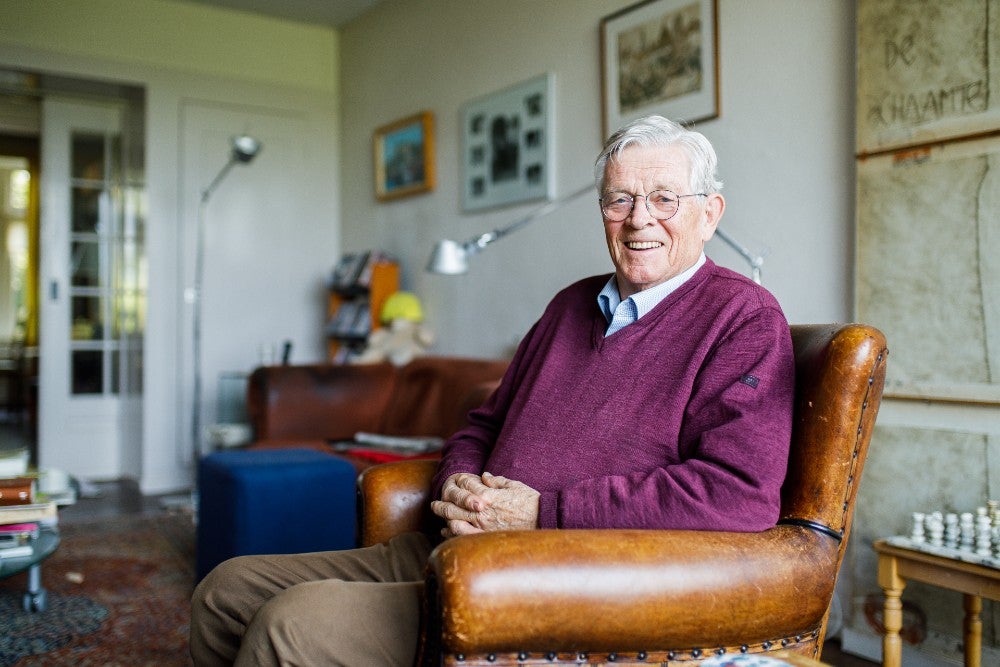Emeritus Professor Arend Soeteman (76), who served as dean of our Law faculty for many years, has been chairperson of the Kuyperfonds (Kuyper Fund) since 2010. „While Kuyper’s ideas are not the be-all and end-all for us, we do feel his legacy is important."
Can you, as Kuyper’s spokesperson of sorts, explain why Kuyper continues to be inspiring to this day?
„Well, I wouldn’t go so far as to call myself his spokesperson; I consider myself more of an admirer. I believe Kuyper’s ideas about the personal responsibility of individuals and organisations are still relevant today. For example, he argued that the state and local authorities should not intervene in every sphere of life. Kuyper introduced the concept of ‘sphere sovereignty’, which meant that entities such as churches, commercial businesses, and universities all have a personal responsibility that is independent from the state."
„While what we now call ‘civil society’ was not invented by Kuyper, he was the person who underscored how important its powers were and felt they were vital to a healthy society. You cannot create a society based on a well-run government alone – that is a particular idea of Kuyper’s that still resonates today."
You used to be the dean of our Law faculty. Were Kuyper’s ideas an influence on your policies back then?
„Not really, as I was concerned more with general faculty governance and so on, but earlier on in my career his ideas often came up in discussions. When my predecessor, Professor Van Eikema Hommes, was a professor and I served under him as a faculty member, we would often disagree on ideas and opinions inspired by Kuyper, such as the specific nature of all kinds of communities, including the family."
„When I expressed my objections, he told me I was either stupid or a bad Christian."
„Van Eikema Hommes was rather conservative in his views, and back in the 1970s he still had very traditional ideas about issues such as gender relations. He believed that the man was the head of the wife and that this role fulfilled the woman’s natural need to accept the man’s authority. Well, I can tell you my own wife wasn’t having any of that! When I expressed my objections, he told me I was either stupid or a bad Christian. Because of my discomfort with his views, I ended up working at other universities for several years, but when the chair became vacant at the VU, I was very happy to return to the fold."

How do you and the other members of the Kuyper Fund feel about the current revival of interest in Kuyper and his work?
„We’re pleased, of course, and wholeheartedly endorse the Kuyper Anniversary Year; it’s good to see his legacy being upheld in this way. But the focus of our foundation extends beyond Kuyper alone; we also provided funding for a biography of Barend Biesheuvel, and another biography, about Ruud Lubbers (both former Dutch prime ministers), is currently in the works. We also regularly support the meetings of the Christelijk-Sociaal Congres (Christian-Social Congress)."
So what role does Kuyper play in the Fund?
„We carry out our work in his spirit; like him, we were raised in the Reformed church and tradition. Our foundation was established against the backdrop of the Anti-Revolutionary Party, one of the political parties that was eventually integrated into the Christian Democratic Appeal (CDA). As is well documented, Kuyper founded the Reformed Churches in the Netherlands, the VU (which initially only admitted Reformed Christian students), and the Anti-Revolutionary Party. While Kuyper’s Reformed ideas are not the be-all and end-all for us, we do try to keep his legacy alive."
„They encourage people to engage in discussion rather than argue."
What are some of the other objectives of the Fund?
„During the first social congress in 1891, Kuyper gave a passionate speech in which he revealed a distinctly social side of himself. Our Fund very much advances a social mission as well: we support all sorts of initiatives that help improve communities. We’re currently supporting the Stichting Socires (Socires Foundation), which is dedicated to bringing together people from different backgrounds to discuss topical issues, such as employer-employee relationships and environmental issues. They encourage people to engage in discussion rather than argue, and they promote an economic system in which not all the power is held by those who hold the purse strings."
The Kuyper Fund also provides financial support for the Kuyper Chair at the VU, which is currently held by Govert Buijs. How does his research tie into Kuyper’s ideas?
„One requirement is that the research must be carried out in the Christian-democratic tradition and in the spirit of Christian social philosophy. Govert is working on several publications relating to labour, and he is reflecting on how we spend our productive lives; the fact that it’s not just about making money, but also about finding some sort of meaning in the work we do. He is attempting to present an alternative approach, one that acts as a counterpoint to the pursuit of economic growth. His research also focuses on the question of how we should interact with each other as members of society. I think Kuyper himself would actually have learned a thing or two from reading Govert’s publications, since he had been known to get burnt out at times."








